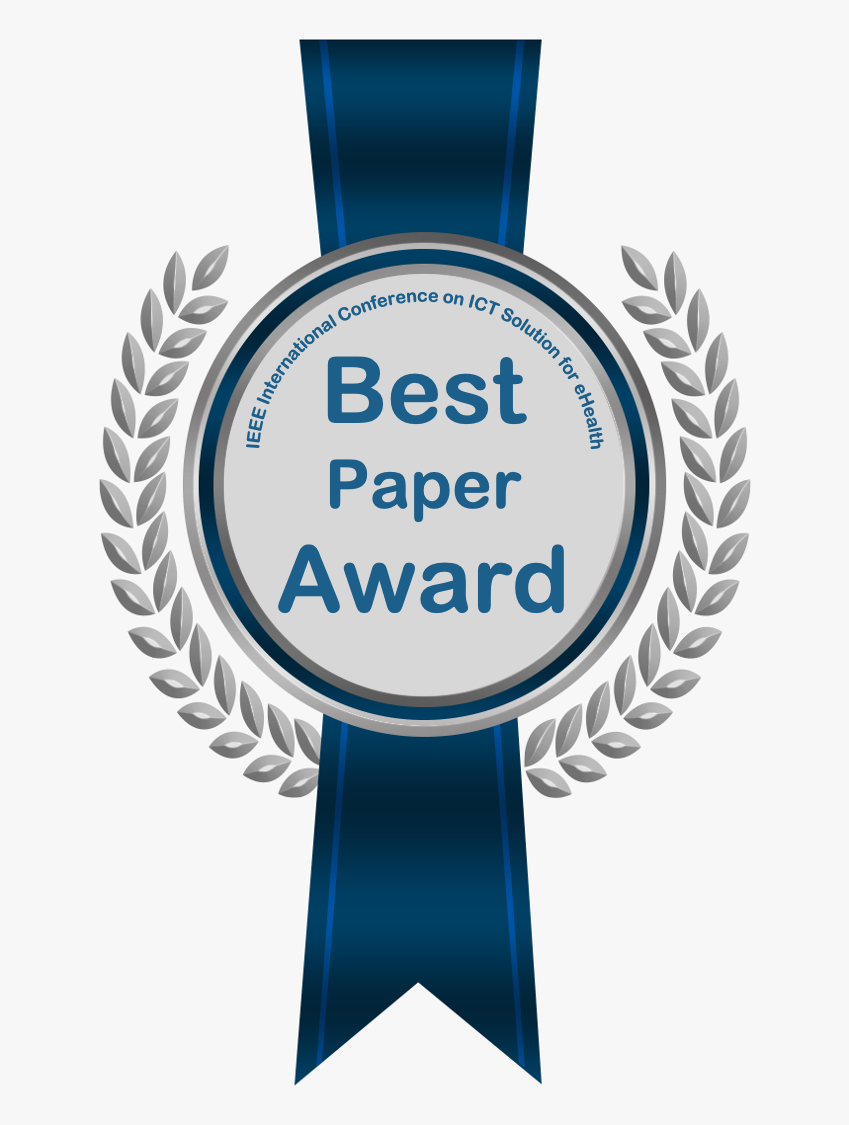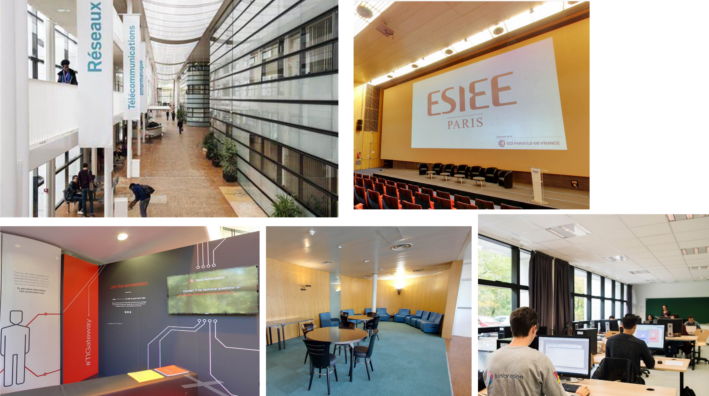Welcome to the 4th IEEE International Conference on ICT Solutions for eHealth
in conjunction with the 29thIEEE Symposium on Computers and Communications (ISCC)
The program of the conference is now available:
Download ICTS4eHealth 2024 Program Schedule
e-Health is one of the major research topics that have been attracting cross-disciplinary research groups. The deployment of new emerging ICT technologies for Health, especially based on Cloud computing, Internet of Things (IoT), and Computational Intelligence, is attracting the interest of many researchers.
Following five successful workshop editions, three years ago ICTS4eHealth became an International IEEE Conference, and we are now proud to announce the fourth edition of this popular conference dedicated to ICT solutions for e-Health, especially based on Cloud computing, Internet of Things (IoT), and Computational Intelligence.
The conference will bring together researchers from academia, industry, government, and medical centers in order to present the state of the art in the emerging area of the use of cloud systems in connected health infrastructure and applications, and the use of IoT and Computational Intelligence techniques in the area of eHealth.



Steering Committee

Mission
e-Health is one of the major research topics that have been attracting cross-disciplinary research groups. The deployment of new emerging ICT technologies for Health, especially based on Cloud computing, Internet of Things (IoT), and Computational Intelligence, is attracting the interest of many researchers.
The use of Cloud computing, IoT technologies, and methods typical of Soft Computing and Computational Intelligence have been very prominent recently and can be of great help in finding good solutions to many practical healthcare applications.
For instance, health monitoring, health data storage, health data collection, mobile health, pervasive health, healthcare monitoring, telemedicine, context-aware computing, ubiquitous computing, processing health data in the cloud, securing health data in the cloud and Assistive Technology (AT) are areas of interest that are being addressed using cloud computing and IoT techniques. On the other hand, several challenging issues have raised due to the adoption of such emerging technologies. These include the quality of health data, the ability to retrieve information and use it in health context, as for example in tasks related to machine learning, knowledge discovery, decision support, regression, forecasting, optimization, feature selection, and additionally privacy and security issues of health data while being processed in the cloud, availability of health data, models of context and tele-monitoring of contextual applications.
Following five successful workshop editions, three years ago ICTS4eHealth became an International IEEE Conference, and we are now proud to announce the fourth edition of this popular conference dedicated to ICT solutions for e-Health, especially based on Cloud computing, Internet of Things (IoT), and Computational Intelligence.
The conference will bring together researchers from academia, industry, government, and medical centers in order to present the state of the art in the emerging area of the use of cloud systems in connected health infrastructure and applications, and the use of IoT and Computational Intelligence technique in the area of eHealth.
General Chair
Giovanna Sannino
ICAR-CNR, Italy
Technical Program Co-Chairs
Alessio Catalfamo
University of Messina, Italy
Fabrizio Celesti
University of Siena, Italy
Ivanoe De Falco
ICAR-CNR, Italy
Publicity Chair
Annamaria Ficara
University of Messina, Italy
Honorary Chair
Giuseppe De Pietro
Director of ICAR - CNR, Italy
Keynote:
Prof. Hani Hagras
Talk: Towards Explainable Artificial Intelligence enabled Effective Health Care
Artificial Intelligence (AI) is perceived as a new industrial revolution. However, the use of Opaque BOX AI algorithms could result in a lack of transparency to users . For the Health care sector, there is a need for greater transparency through the creation of human friendly explainable AI (XAI) systems. The XAI concept provides an explanation of individual decisions, enables understanding of overall strengths and weaknesses, and conveys an understanding of how the system will behave in the future and how to correct the system’s mistakes. In this keynote speech, Hani Hagras introduce the concepts of XAI to achieve effective healthcare system which can provide personalised and trusted care and can help to gain better understanding for underlying health concepts to provide personalised care.
Bio:
Hani Hagras is a Professor of Artificial Intelligence, Head of the Artificial Intelligence Research Group and Director of the Computational Intelligence Centre in the University of Essex, UK. He is a Fellow of Institute of Electrical and Electronics Engineers (IEEE), a Fellow of the Institution of Engineering and Technology (IET), Principal Fellow of the UK Higher Education Academy (PFHEA) and Fellow of the Asia-Pacific Artificial Intelligence Association (AAIA). His major research interests are in Explainable Artificial Intelligence, computational intelligence and data science .He has authored more than 500 papers in international journals, conferences and books. He is Among the top 2% of the most-cited scientists in the world (Scopus August 2023). His work has received funding from major research councils and industry. He has also Elven industrial patents in the field of Explainable AI, computational intelligence and intelligent control. His research has won numerous prestigious international awards where he was awarded by the IEEE Computational Intelligence Society (CIS), the 2013 Outstanding Paper Award in the IEEE Transactions on Fuzzy Systems and also he has won the 2004 Outstanding Paper Award in the IEEE Transactions on Fuzzy Systems. He was also awarded the 2015 and 2017 Global Telecommunications Business award for his joint project with British Telecom. In 2016, he was elected as Distinguished Lecturer by the IEEE Computational Intelligence Society. His work has also won best paper awards in several conferences including the 2014 and 2006 IEEE International Conference on Fuzzy Systems and the 2012 UK Workshop on Computational Intelligence.
Topics:
Conference Topics Include (But Are Not Limited To):
- Artificial Intelligence for eHealth
- Cloud computing applications for eHealth
- Internet of Things (IoT) applications for eHealth
- Assistive Technology (AT)
- Networking and Monitoring in Bio-systems
- Management and Organization of BME Environments
- Bioinformatics and Computational Biology and Medicine
- Monitoring of Vital Functions with Sensor and ICT Systems
- Biosensors and Sensor Networks
- Advanced Bio-signal Processing
- Distributed BME Applications
- Telehealth, Telecare, Telemonitoring, Telediagnostics
- e-Healthcare, m-Healthcare, x-Health
- Assisted Living
- Smartphones in BME Applications
- Social Networking, Computing and Education for Health
- Computer Aided Diagnostics
- Improved Therapeutic and Rehabilitation Methods
- Intelligent Bio-signal Interpretation
- Explainable and Interpretable AI models for Health, Biology and Medicine
- Federated Learning for Medical and Healthcare Data
- Signal and Image processing for Health
- Data and Visual Mining for Diagnostics
- Advanced Medical Visualization Techniques
- Personalized Medical Devices and Approaches
- Modelling and Computer Simulations in BME
- Human Responses in Extreme Environments
- Other Emerging Topics in BME
- e-Accessibility, web accessibility
- Hardware & Software personalized assistive technologies
- Assistive systems for users who are blind or visually impaired
- Integration between home-based assistive technologies and patient health data
- User-centered design of electronic assistive technologies
- Usability of assistive technologies
- Computer vision in AT
- User interfaces for home-based assistive technologies
- Use of prescription systems and assistive technologies
- Experience from real world assistive environment deployment
- Assistive Technologies for Urban Environments
- Healthcare modeling and simulation
- Knowledge discovery and decision support
- Biomedical data processing
- Wearable devices
- Sensor-based mHealth applications
- Security and Privacy in eHealth
The use of Soft Computing/Computational Intelligence methods in facing problems in the above topics is highly welcome, although by no way compulsory.
Submission
ICTS4eHealth main conference:
Manuscripts should describe original work and should be no more than 7 pages in the IEEE double-column proceedings format, including tables, figures and references.
In order to download manuscript templates for IEEE conference proceedings use the following link:
Papers can be submitted directly to EDAS:
Note that accepted papers up to 6 pages will be published with no additional charge. Exceeding pages will be charged an additional fee. Papers exceeding 7 pages will not be accepted.
At least one author of each accepted paper is required to register to the conference and present the paper. Only registered and presented papers will be published in the conference proceedings.
Accepted papers will be included in the proceedings of
Call for Special Session Proposals
The Steering Committee of IEEE ICTS4eHealth 2024 invites and welcomes you to submit proposals for exciting Special Sessions which should mandatorily include paper submission on topics relevant to the conference areas.
The Special Session intends to address current and future research and application topics, through experts in the field and may include, other than the paper presentation, discussions, and interactions among participants.
If you intend to propose and organize a special session, please submit a proposal by sending an email to
Title of the Special Session A brief description of the area of concern (approx. 100 words), with special focus on why this is considered to be an interesting and significant topic. The name and contact information of two or more Special Sessions chairs, who are willing to promote and organize a sufficient amount of quality submissions to the Special Sessions. Please also indicate the short bio of the organizers.
Once approved, it is the duty of the organizers to publicize the Special Session among researchers and practitioners in the field and attract a sufficient number of papers. Papers submitted to Special Session will undergo the same review process as regular papers. The Special Session organizers are responsible for managing the review process, assuring at least three reviews per paper. This includes the creation of a Special Session Technical Program Committee.
Before starting the review process, Special Session organizers must explicitly declare papers which present a conflict of interest for them. Any conflict of interest will be managed by the ICTS4eHealth organizers.
A minimum of 8 submitted papers, with an acceptance rate of 50% maximum, is required for each session.
- Submission deadline for Special Session Proposals:
February 26, 2024 - Notification of acceptance:
February 29, 2024
Accepted Special Sessions:
SS-GAIMHS: Generative AI for Medical and Healthcare System
Over time, there has been increased development and interest in the use of generative AI. Even in the medical field, researchers have proposed and continue to propose the use of generative AI for various tasks. Patient records are hard to come by, medical data available to researchers are often few, unbalanced and incomplete. These types of problems can be addressed by using generative models for data augmentation. Generative AI is also the basis of modern chatbots, which can prove to be a useful support tool in the medical field. Other fields where the use of Generative AI is becoming more widespread are medical image reconstructions and enhancements, which for example can be resolution enhancement, noise reduction, occlusion removal, and more in medical images. An important issue for high-risk problems, such as the medical field, is the need to develop and use explainable AI models at the expense of black-box models; Generative AI models are not exempt from this obligation. The goal of this special session is to give researchers an opportunity to present and discuss their work proposing the use of generative AI for medical and health applications, while also providing some food for thought for future research directions.
TOPICS (but are not limited to):- Data Augmentation with Generative Models
- Explainability and Interpretability in Generative AI
- Generative Natural Language Models for Clinical Decision Support
- Super Resolution, Colorization and Inpainting in Medical Imaging
- Reconstruction and Denoising of Medical Resonance Images (MRI) or Computed Tomography (CT)
- Generative AI for Patient Data Sharing Problems
- Image segmentation in Medical Imaging
- Weakly supervised approaches in Generative AI for Medical Systems
- Image translation and domain adaptation of Medical Imaging
- Image reconstruction from Medical instruments
- Anomaly Detection in Medical Imaging using Generative AI
- Issues and Challenges in Generative AI for Medical and Healthcare System
- Generative AI for real-world Healthcare scenarios
- Vincenzo Bevilacqua, ICAR-CNR, Italy
- Prof. Angelo Ciaramella, University of Naples "Parthenope", Italy
- Antonio Di Marino, ICAR-CNR, Italy
- Dr. Emanuel Di Nardo, University of Naples "Parthenope", Italy
ICTS4eHealth Registration Fees:
Please carefully check the registration instructions at https://2024.ieee-iscc.org/registration/
(all prices are displayed in euros)
| Type | Early Registration | Late Registration |
|---|---|---|
| IEEE Member Conference Registration | €380 | €480 |
| Non – IEEE Member Conference Registration | €440 | €540 |
| IEEE STUDENT Conference Registration | €266 | €336 |
| Non – IEEE STUDENT Conference Registration | €308 | €378 |
Registration includes: access to the Conference Sessions, Conference Proceedings, Coffee breaks and Lunches during the realization days, welcome reception and gala dinner. STUDENT Registration requires documentation that proves a registered Student status, such as: student’s ID or a letter from the Head of Department/Director of Doctoral School prepared on the notepaper of the institution. This documentation must be sent to epy@epy.gr indicating "ISCC 2024, STUDENT STATUS DOCUMENTATION" in the subject field. STUDENT Registration without association to a student documentation will not allow the corresponding attendee to access the conference. |
|
Any administrative/bureaucratic/financial/registration/visa issue is directly managed by the mother conference ISCC.
Therefore, authors can contact ISCC organizers to ask them any question about registration.
Technical Program Committee
- Mehdi Adda - University of Quebec at Rimouski, Canada
- M. Shahwaiz Afaqui - Teesside University, United Kingdom
- Nasimuddin Ahmed - India & TCS Research & Innovation, India
- Marco Aiello - IRCCS SDN, Italy
- Saad Aldoihi - KACST, Saudi Arabia
- Mohammed Alghamdi - Al-Baha University, Saudi Arabia
- Ilaria Angela Amantea - University of Torino, Italy
- Islam Atef - Smouha, 28 tot ankh amon, Egypt
- Bigomokero Bagula - University of the Western Cape, South Africa
- Daniel Batista - University of Sao Paulo, Brazil
- Diana Gratiela Berbecaru - Politecnico di Torino, Italy
- Cinzia Bernardeschi - University of Pisa, Italy
- Antonios Billis - Aristotle University of Thessaloniki, Greece
- Nizar Bouguila - Concordia University, Canada
- Adel Bouhoula - Arabian Gulf University, Bahrain
- Susana Brás - Universidade de Aveiro, Portugal
- Philipp Brauner - RWTH Aachen University, Germany
- Celso Brennand - Federal Rural University of Pernambuco, Brazil
- Mattia Campana - IIT-CNR, Italy
- Claudia Canali - University of Modena and Reggio Emilia, Italy
- Antonio Caruso - University of Salento, Italy
- Edson Carvalho - Universidade Federal do Piauí, Brazil
- Gabriella Casalino - University of Bari Aldo Moro, Italy
- Sudarshan Chawathe - University of Maine, USA
- Reda Chefira - Private University of Marrakesh, Marocco
- Stefano Chessa - Universita' di Pisa, Italy
- Christos Chrysoulas - Edinburgh Napier University, United Kingdom
- Gianluca Ciattaglia - Polytechnic University of Marche, Italy
- Stefania Costantini - University of L'Aquila, Italy
- Gabriele D'Angelo - University of Bologna, Italy
- Renato de Moraes - Federal University of Pernambuco (UFPE), Brazil
- Andrea De Salve - National Research Council (CNR), Italy
- Franca Delmastro - IIT-CNR, Italy
- Flavio Di Martino - IIT-CNR, Italy
- Massimiliano Donati - University of Pisa, Italy
- José dos Reis - Federal University of Piaui, Brazil
- Drajic Dejan - DunavNET, Serbia
- Khaled Elkarazle - Swinburne University of Technology, Australia
- Hamdi Eltaief - Research Lab PRINCE, Tunisia
- Fabrizio Falchi - ISTI-CNR, Italy
- Lei Feng - Beijing University of Posts and Telecommunications, China
- Stefano Ferretti - University of Urbino, Italy
- Stefka Fidanova - Bulgarian Academy of Sciences, Italy
- Antonio Filograna - Engineering Ingegneria Informatica S.p.A., Italy
- Alessandro Floris - University of Cagliari, Italy
- Stefano Forti - University of Pisa, Italy
- Miguel Franklin de Castro - Federal University of Ceará, Brazil
- Alberto Freitas - Faculty of Medicine of the University of Porto, Portugal
- Sebastian Fudickar - University of Luebeck, Germany
- Michele Girolami - ISTI-CNR, Italy
- Akiko Hanai - Chiba University, Japan
- Faisal Hussain - Al-Khawarizmi Institute of Computer Science (KICS), Pakistan
- Hanen Idoudi - University of Manouba, Tunisia
- Eder J. Scheid - Federal University of Rio Grande do Sul, Brazil
- Aryan Jadon - Juniper Networks Inc, USA
- Ayman Kayssi - American University of Beirut, Lebanon
- Javed Khan - University of Hertfordshire, United Kingdom
- Alexander Kocian - University of Pisa, Italy
- Panayiotis Kotzanikolaou - University of Piraeus, Greece
- Yu-Sheng Lin - Southern Taiwan University of Science and Technology, Taiwan
- Eirini Liotou - Harokopio University of Athens, Greece
- Xing Liu - University of Washington, USA
- João Alexandre Lobo Marques - University of Saint Joseph, Macao
- Ahmad Lotfi - Nottingham Trent University, United Kingdom
- Haoxiang Luo - University of Electronic Science and Technology of China, China
- Douglas Macedo - Federal University of Santa Catarina, Brazil
- Ramon Malaquias - Federal University of Rio Grande do Norte, Brazil
- Pietro Manzoni - Universitat Politècnica de València, Spain
- Mano Mathew - EFREI Paris, France
- Alina Miron - Brunel University, United Kingdom
- Pooya Moradian Zadeh - University of Windsor, Canada
- Hiroyuki Nozaka - Hirosaki University, Japan
- Ilídio Oliveira - University of Aveiro, Portugal
- Dipti Patil - MKSSS's Cummins College of Engineering for Women, Pune, India
- Zahra Pezeshki - Shahrood University of Technology, Iran
- Marco Picone - University of Modena and Reggio Emilia, Italy
- Niki Pissinou - Florida International University, USA
- Nuno Pombo - University of Beira Interior, Portugal
- Seyedamin Pouriyeh - Kennesaw State University, USA
- Giulia Rafaiani - Università Politecnica delle Marche, Italy
- Rajiv Ranjan - Univserity of New Castle, United Kingdom
- Daniel Ravi - University of Hertfordshire, United Kingdom
- Agata Romano - ASP Messina, Italy
- Linda Senigagliesi - Università Politecnica delle Marche, Italy
- Zubair Shah - Hamad Bin Khalifa University, Qatar
- Mohamed Shaheen - Arab Academy for Science, Technology and Maritime Transport, Egypt
- Edelberto Silva - Universidade Federal de Juiz de Fora, Brazil
- Luis Augusto Silva - Universidad de Salamanca, Spain
- Stefano Silvestri - ICAR-CNR, Italy
- Aditi Site - Tampere University, Finland
- Jan Sliwa - Bern University of Applied Sciences, Switzerland
- Victor Ströele - Federal University of Juiz de Fora, Brazil
- Emilio Sulis - University of Turin, Italy
- Stephen Swift - Brunel University, United Kingdom
- Naresh Thaneeru - Kakatiya University, USA
- Francesco Tusa - University of Westminster, United Kingdom
- Kalum Udagepola - Scientific Research Development Institute of Technology Australia, Australia
- Laura Verde - University of Campania Luigi Vanvitelli, Italy
- Carlos Alberto Vieira Campos - Federal University of the State of Rio de Janeiro, Brazil
- Xinglong Wu - Wuhan Institute of Technology, China
- Michele Zito - University of Naples Parthenope, Italy

Best Paper Award
A "Best Paper Award" Certificate will be conferred on the author(s) of a paper presented at the conference, selected by the Chairs based on scientific significance, originality and outstanding technical quality of the paper, as assessed also by the evaluations of the members of the Program Committee.
Special Issues
Authors of selected papers may be invited to submit extended versions of their papers for publication as full journal papers in special issues organized in prestigious indexed journals.
Important Dates
Venue
ESIEE Paris, France
The school of technological innovation.
ESIEE Paris, n°1 of engineering schools in Ile-de-France. An engineering school specialised in digital, energy and environemental transitions.
Paris, France

Paris is the capital and most populous city of France.
House to beautiful architecture, arresting art and the world's finest restaurant.
Paris is multifaceted and there are numerous ways of discovering it. As well as the top sights, there are many other amazing places.





